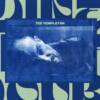Two decades ago, when Tee Templeton was in the middle of his 40s, he decided it was time to finally “grow up”. After a divorce, a slew of years lost in a serial bender, a bipolar diagnosis, and a move to New York City from North Carolina where he hoped to but first failed to get his life together, Templeton finally found sobriety and then a stable, full-time job. He wondered if he should put his lifelong compulsion to write songs aside, so that he could devote his full attention to his job as an employee at NYU’s College of Nursing. But first, he handed his new boss a stack of songs he’d recorded and an album he had made to very little notice, asking for her candid feedback. Should he, he wondered, just move on? Not only was she floored, but she became an ardent advocate for Templeton’s songs, showing up at gigs and helping him haul heavy keyboards up his stairs. She demanded he keep going, that he not lose a love and lifeline he’d had since childhood simply because he’d entered a new phase of adulthood.
Diner of Doubt is, technically speaking, not Templeton’s first album. But it is, in almost every way, a breakthrough for the 66-year-old songwriter sitting on a stockpile that’s loaded with a few hundred pop and rock gems, all distilled from the experiences of his most remarkable life. For the first time, Templeton sought substantial outside help, first to sort through his web of tracks and then to transform them from homemade demos into the proper studio productions they warranted.
Templeton had always struggled to understand what his best work was, since everything he wrote felt important to him, a reflection of his life. So a producer, James D. Donahue, stepped in to help him wade through his work, organizing tracks and suggesting what made sense as a collection. Ringers like drummer Nick Falk and guitarist Adam Agati stepped in to help, galvanizing the layers Templeton had shaped himself. Mark Nevers, the longtime Lambchop member who has worked on records by Bill Callahan, Andrew Bird, and Silver Jews, mixed the results. From the propulsive opener about a lost relationship, “My Dead Friend,” to the surrealistic pop pillow of closer “Living in a Dream World,” Diner of Doubt is an exquisite and urgent set of 11 wise and sophisticated tracks. They evoke the wonderlands of Jon Brion, Moondog and The Cyrkle, the direct accessibility of Elvis Costello, Robyn Hitchcock and The Shins. It took Templeton more than six decades to finish Diner of Doubt; it is better for the wait. Really, it is a testament to that very wait, to perseverance and commitment in the extreme.
Templeton grew up in Starkville, Mississippi, part of a big and deeply religious family of entrepreneurs in that budding college town. His family even released an ambitious album of Christian and patriotic songs, fully orchestrated. Even as a kid, religion never did much for Templeton, but that idea—that you could make music yourself and even release it—ignited his imagination. So did The Wizard of Oz and the Beatles on The Ed Sullivan Show, two verboten cultural touchstones he happened to see on television because he was sick when he was supposed to be at church. His plans to ship off to a music conservatory stalled when his dad asked him to stick around for a year after his mother had died. He settled at Mississippi State, earning a piano performance degree.
He eventually landed in North Carolina, earning a master’s in computer science and working for the nascent tech industry there. He was writing and recording the entire time, in a 3-piece jazz pop band, series of indie rock bands with his then-wife and, later, in a kind of Hare Krishna triphop group whose leader said he had connections in the upper echelons of the music industry. Those, of course, never materialized. Through all of it—eventual divorce, an extended span of binge drinking, a move to New York and membership in assorted bands, that job at NYU—Templeton was compulsively writing songs, sorting through his life in verses written in whatever time he could secret away from the rest of his life.
After Templeton’s father passed, Templeton realized that his father’s legacy allowed him to finally pursue music full-time for the first time in his life, without obligations to work or family or anything else. In 2018, he started a song exchange with an old friend, which they called “High Noon.” Every two weeks on Monday at noon, they’d share a finished tune they’d written since the last deadline. For Templeton, it became an essential exercise in letting go, in deciding that a song was good enough to be heard by someone else. Though he would not reach out to Donahue for another few years, these High Noon exercises expanded his already-massive song index and pushed him toward actually doing something with this music, to entering a new phase of being a songwriter suddenly in his 60s. That new phase begins in earnest with Diner of Doubt.
Diner of Doubt encapsulates so much that Templeton has seen and done. He has been sitting with “Frozen Arrows” for 30 years, for instance, waiting for the right time to record and release it. A string-gilded ode to the numbness that experience and endurance can bring, it crystallizes so much of what Diner of Doubt is about—the twists, the turns, the unexpected maneuvers of existence. Much newer is “I Am the Man,” a beat machine-and-synthesizer scramble that evokes Thom Yorke’s solo records. It feels like Templeton is taunting himself, questioning his self-worth by proclaiming in a mechanically warped voice that he is “the man.” Haunted by blue horns, carnival keyboards, and a teasing bassline, “Whistlers in the Graveyard” surveys doubt and loss and all the ways you press on, anyway. “You chose your path, but fate took it back,” Templeton sings, his voice touched by a telling hint of fatigue. “Well, wantin’s half the effort, but that won’t get you jack.” It’s a mantra for moving forward. Diner of Doubt overflows with them.
Entertainment, even art, so often hinge on youthful enthusiasm, on the way young people tell us they’re experiencing the world. There’s newness and vigor there, we naturally tell ourselves. But that’s not the only way to view a life. Templeton—who actually forgets he’s in his mid-60s so often he apologizes for it—has had a strange six decades on this earth, his highs and lows so extreme that each successive revelation feels jolting. But he doesn’t regret any of it or that took him so long to make this record. His life and all his strange times are funneled into these songs and the hundreds he is now sorting through for his next records. (Plural intended). That old compulsion to write, he says, has still not faded. He is ready for what’s next. With it, the curtain finally opens on a remarkable pop songsmith, no matter how late the arrival.




